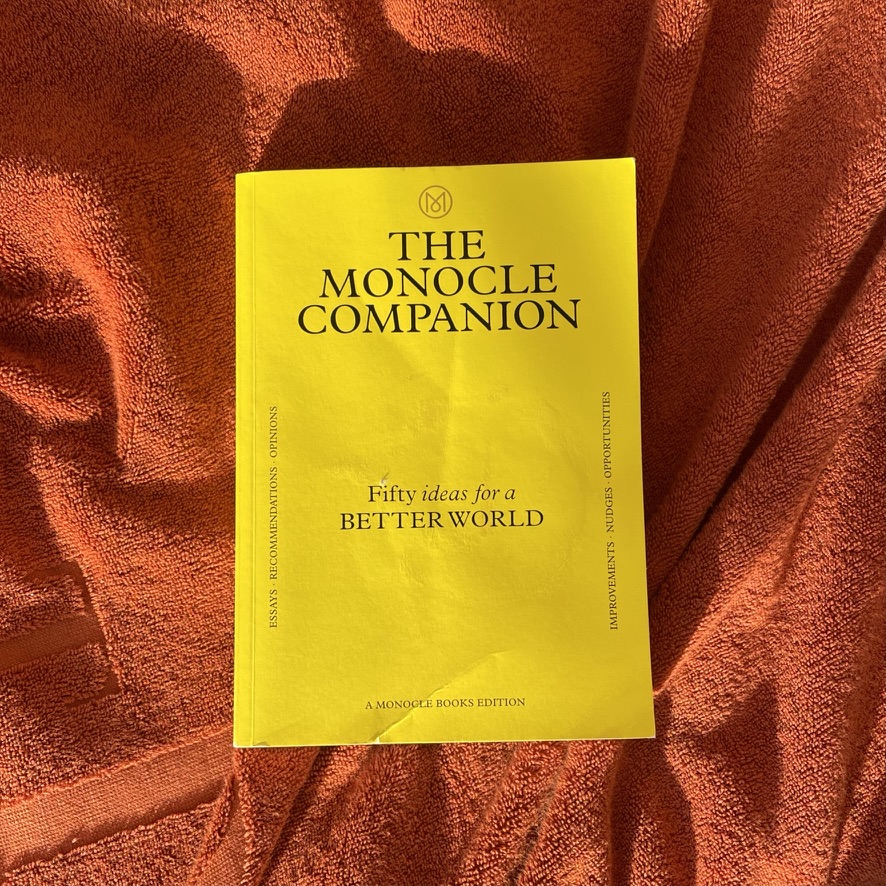I’ve been reading the latest Monocle Companion

I’ve recently read the latest Monocle Companion while on holiday, its slightly battered appearance being testament to the not-quite-library conditions in which I read it. These paperbacks, of which this is the third, are collections of short essays by Monocle contributors, many of them previously published elsewhere. This is the first collection that I’ve read.
I’m milking two posts out of this, so you’ll be getting more tomorrow. Firstly, I want to tell you about an essay by Andrew Mueller which gave me pause for thought. Mueller is sharing his lessons from 35 years as a journalist.
Online, everything is forever. Every so often, some outraged archivist will dig up something stupid or obnoxious that I wrote for the music press when I was much younger, and much less clever than I thought, and brandish it angrily at me via email or Twitter, demanding to know whether I penned the offending snippet. Yes, I’ll tell them, I did. I wouldn’t write it now, and I won’t defend it now, but that is indeed my byline and, while there are probably more productive uses of everyone’s energy, I am accountable for it.
I occasionally doubt my own decision to keep over 20 years’ worth of blog posts on this site. Like Mueller, I wrote some stuff when I was younger that feels embarrassing today. But even if I were to delete the back catalogue, “online, everything is forever”: it’s not like it would be hard to find cached copies. And, in the end, to delete it is just to disown it, and I’m not confident that changes anything.
There is a lot on here that I wouldn’t write today. But I did write it, it is out there, and there’s nothing to be gained by trying to delete it now rather than trying to maintain it in some sort of context.
Even with the best will, and the most meticulous diligence, you are going to get things wrong. In journalism, if all works as it should, a sub-editor will catch it between your keyboard and the page (and if they do, thank them). But if they don’t spot it, a reader will and they will write in to make it known. So always respond gratefully and humbly. This life offers few more exultant joys that being proved right and you should not wish to deprive anybody else of that.
I’m a doctor, not a journalist, by my goodness this felt familiar. Some of the most frustrating professional experiences of my life have come about through people being unwilling to admit errors, even when they are plainly visible.
We all get things wrong. It is when we get things wrong that we’re most able to learn, both from the error itself, and from understanding how the error arose. Was it a misjudgement? A misunderstanding? A lack of knowledge? A simple slip? A systemic issue?
It’s rare in any part of medicine that we can implement a change that will have a lasting impact on numerous people: mistakes are a golden opportunity to do exactly that, by preventing others from experiencing the effects of the same error repeated. To ignore mistakes, or to pretend they don’t exist, is to pass up a golden opportunity.
The best result of all is where the error is solely mine, perhaps because I misunderstood something or misread something or failed to take something into account. Those situations provide the opportunity for personal growth, to share learning, and to be open, allowing me to cultivate precisely the culture in which I’d prefer to work.
You should do the best you can at what you do, of course. But you don’t get to decide its, or your, value to anybody else.
Hurrah for that statement. My professional life would be much less enervating if I wasn’t regularly told that ‘service changes’ or ‘modernisations’ or ‘system improvements’ were extremely valuable in terms of making my life easier when the opposite is true.
This post was filed under: Post-a-day 2023, What I've Been Reading, Andrew Mueller, Monocle.
